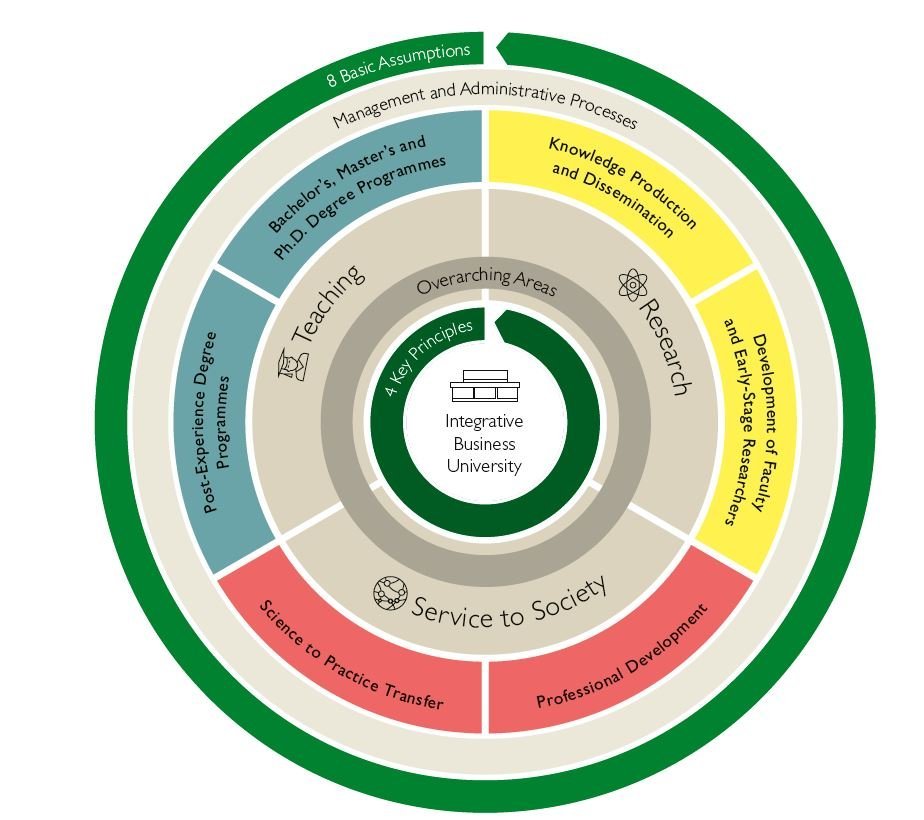How we approach and understand quality
Our approach to quality and quality development is a holistic one, in which quality and quality development are seen as integral to the tasks and responsibilities of the University’s individual members and bodies. The orientation towards the following four principles is at the core of our understanding of quality:
1. Strategy orientation
Quality and quality development are governed by the Higher Education Act and by the University Strategy and are reviewed and further developed every three to five years in conjunction with any revisions of applicable law and strategy adjustments. The applicable core values of the University, as adopted by the Senate in the University’s Code of Conduct, provide the normative framework for quality development at the University.
2. Orientation towards core processes
Quality development at HSG focuses on developing its three core areas (teaching, research and services). The overarching goals of the University’s approach to quality are to monitor the relevant influencing factors (in terms of input, process and output/outcome) as closely as possible, both in and around processes in the core areas, and to support their targeted development. Likewise, developing support processes and management tasks continuously improves the framework conditions for processes in the core areas.
3. Evidence-based approach
The actors responsible for quality development in the core areas (teaching, research and services) are supported by the University’s central bodies (data collection and analysis, as well as suitably processed information). This enables informed decisions on quality development. The University’s support processes and management processes are also executed in an evidence-based manner.
4. Continuous improvement
The University’s approach to quality aims to achieve continuous improvement rather than conformity with fixed standards or predefined target values. The data-based monitoring of indicators and of the variables influencing quality in the core areas is used to further develop quality standards and requirements within the core areas.
The above four principles are specifically defined both for University's core areas (teaching (incl. postgraduate programmes), research and services) and University's administration and management via interaction between the top-down and bottom-up processes.
Joint and shared responsibility
The University of St.Gallen (HSG) regards quality and quality development as multidimensional requirements. The quality of the University’s core areas (teaching, research and services), management and administration can be differentiated in terms of effectiveness (effects) and procedure (efficiency). The University is committed to pursuing both dimensions of quality. Quality development arises from the interplay of the duties and responsibilities of the University’s actors at all levels, as well as from the organisational responsibility (discharged via regulations) of the University.

The above illustration emphasises the integrative nature of the University's approach to quality. It illustrates that quality develops primarily in the coordinated interaction of all participants in joint and shared responsibility.
The quality assurance and development (QAD) measures and structures of the University are described in the Quality Development Guidelines which conceptually consolidates the quality approach practiced at the University.
University as an expert organisation
At the University, quality and quality development are based on an understanding of the University as an expert organisation whose academic staff enjoys a high degree of autonomy and is coupled with the institution.
Quality development service unit
The tasks of the service unit include the support, coordination and implementation of quality assurance and development measures in the areas of teaching, research, executive education, and administration. In doing so, it acts as an interface between centralized, decentralised as well as internal and external quality management. The Quality Development team is responsible for organising and coordinating national and international accreditations, supporting ranking activities, conducting, and further developing evaluations, and providing monitoring tools to support programme management in identifying areas for development. Finally, the service unit is responsible for language quality assurance.
Contact
Karen Tinsner-Fuchs
Dr.
Head of Quality Development
Qualitätsentwicklung
Büro 58-329
Tellstrasse 2
9000 St. Gallen
Büro 58-329
Tellstrasse 2
9000 St. Gallen
Johanna Franziska Gollnhofer
Prof. Dr.
President's Delegate for Quality Development
IMC-HSG
Büro 32-206
Dufourstrasse 48
9000 St. Gallen
Büro 32-206
Dufourstrasse 48
9000 St. Gallen